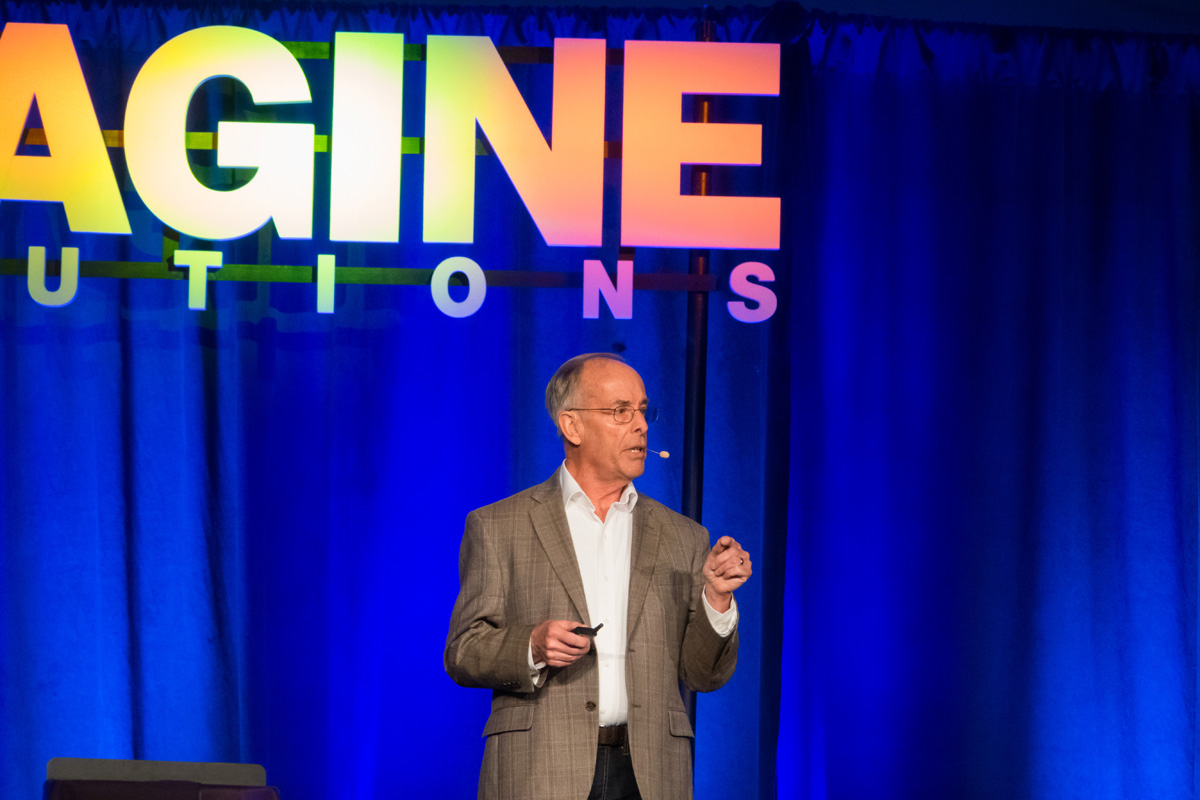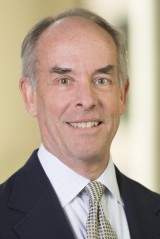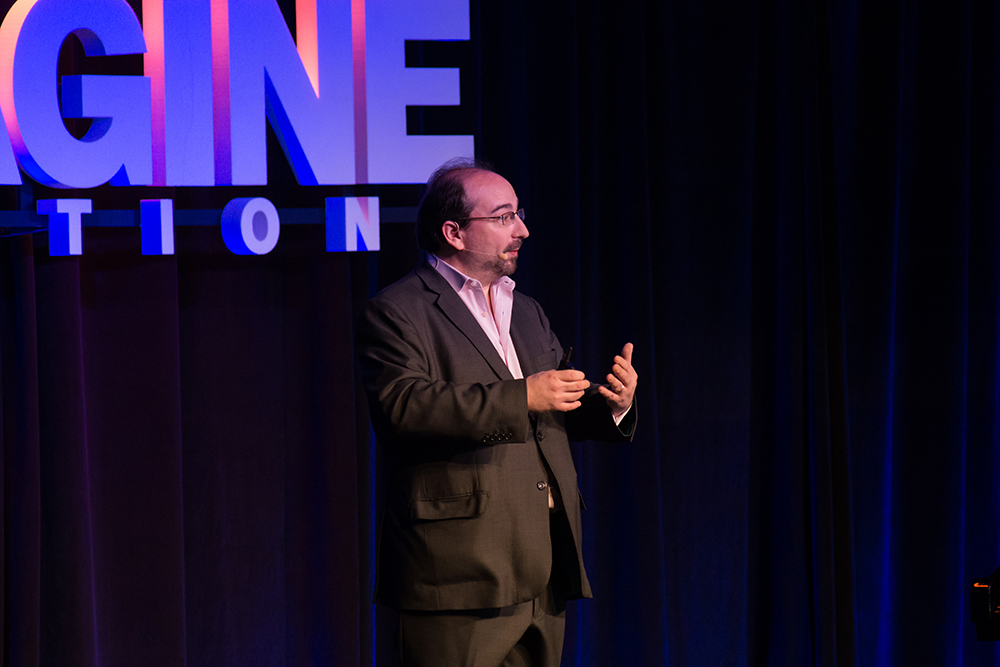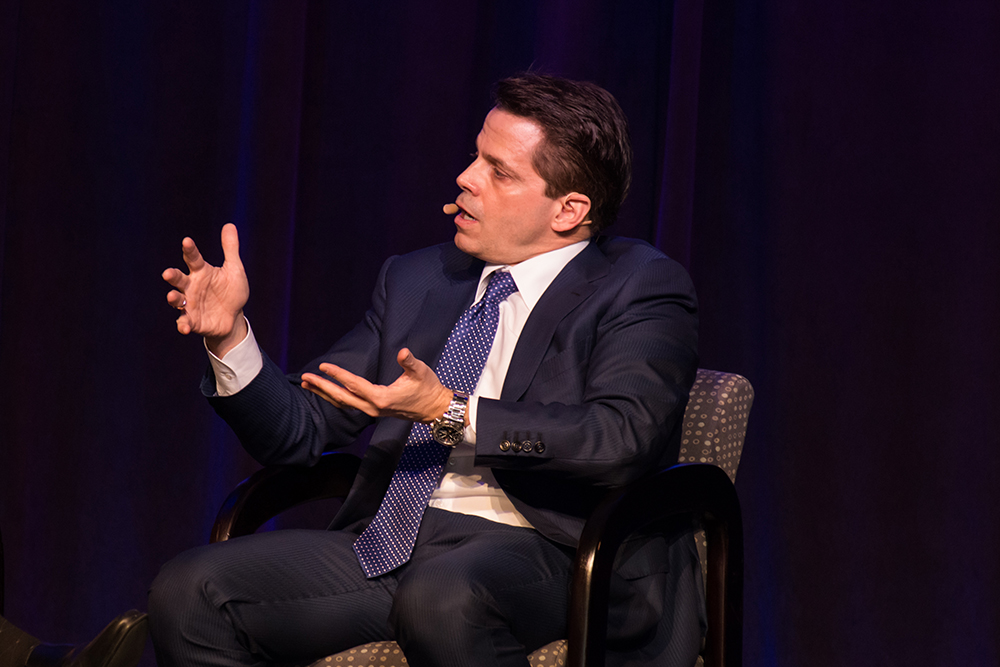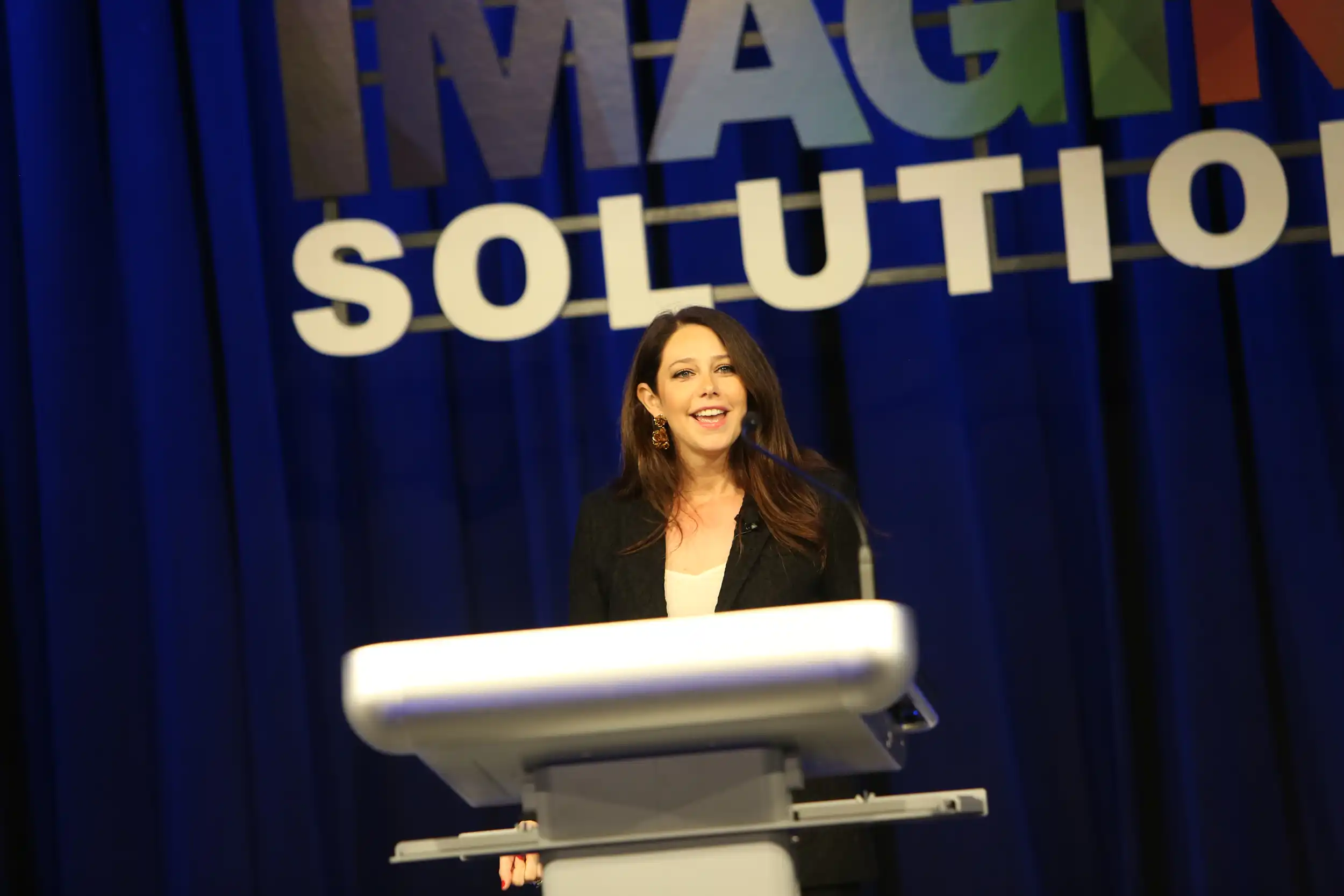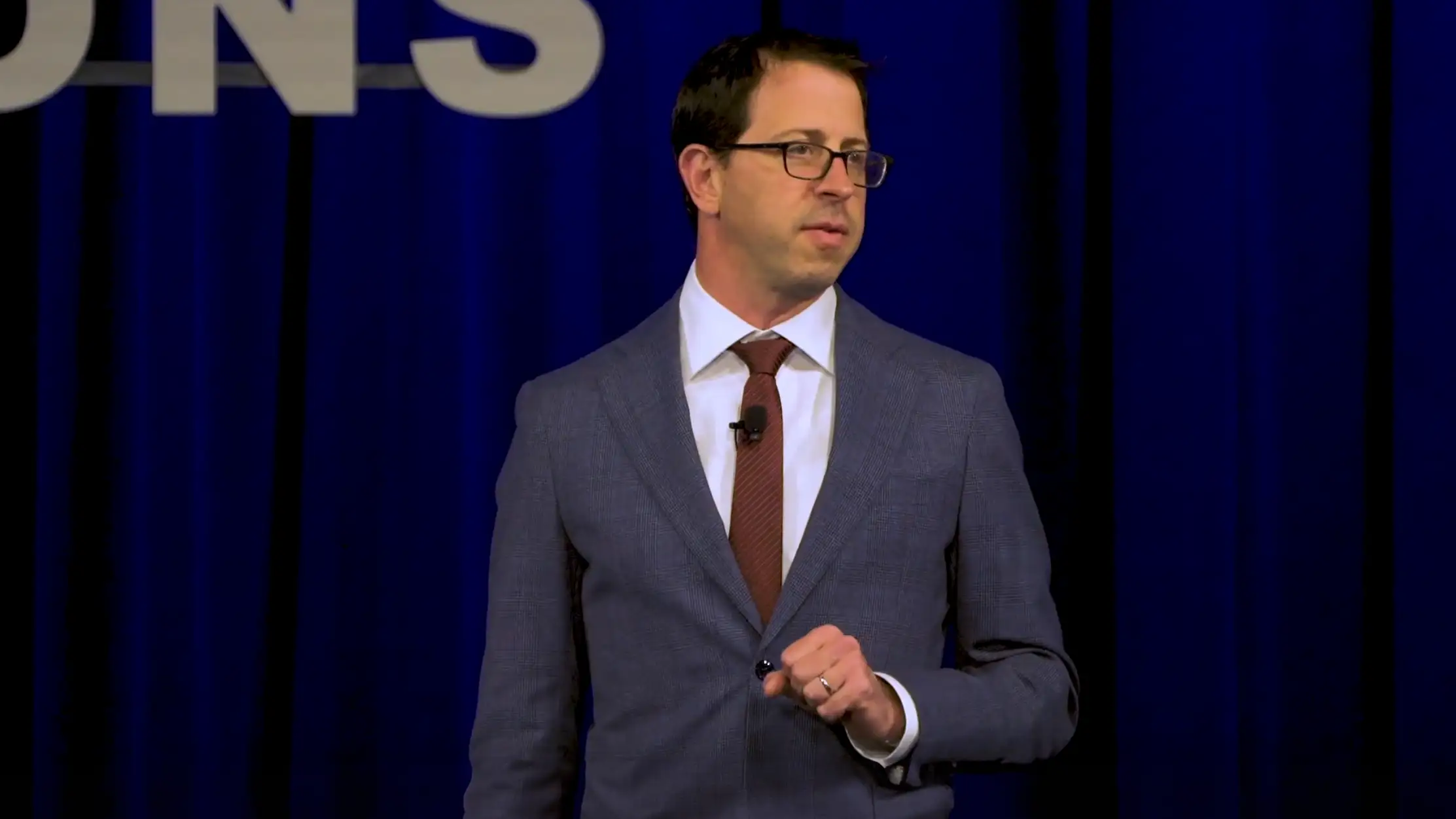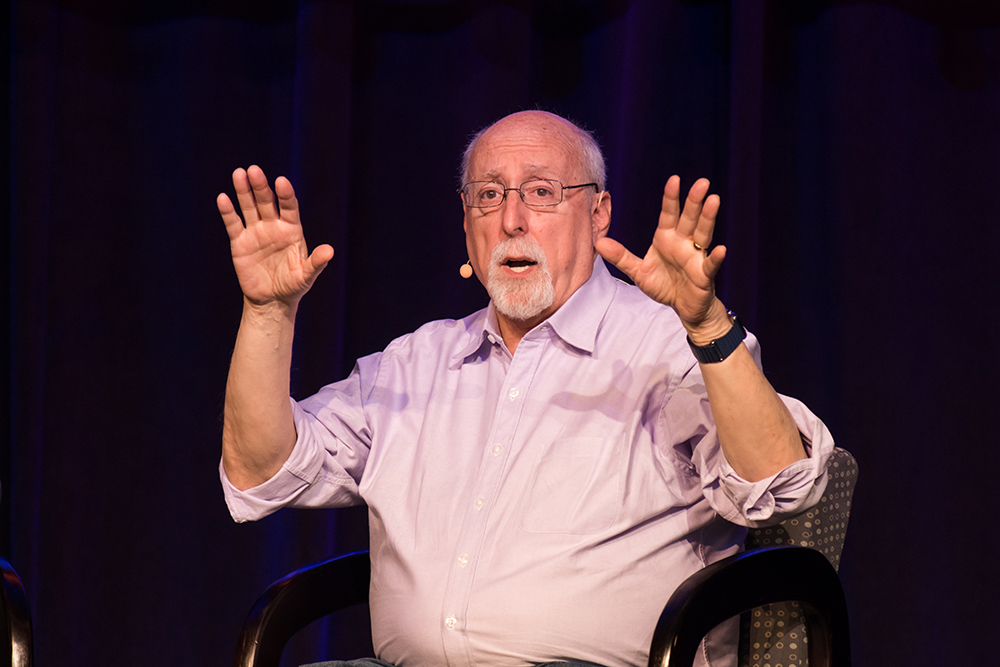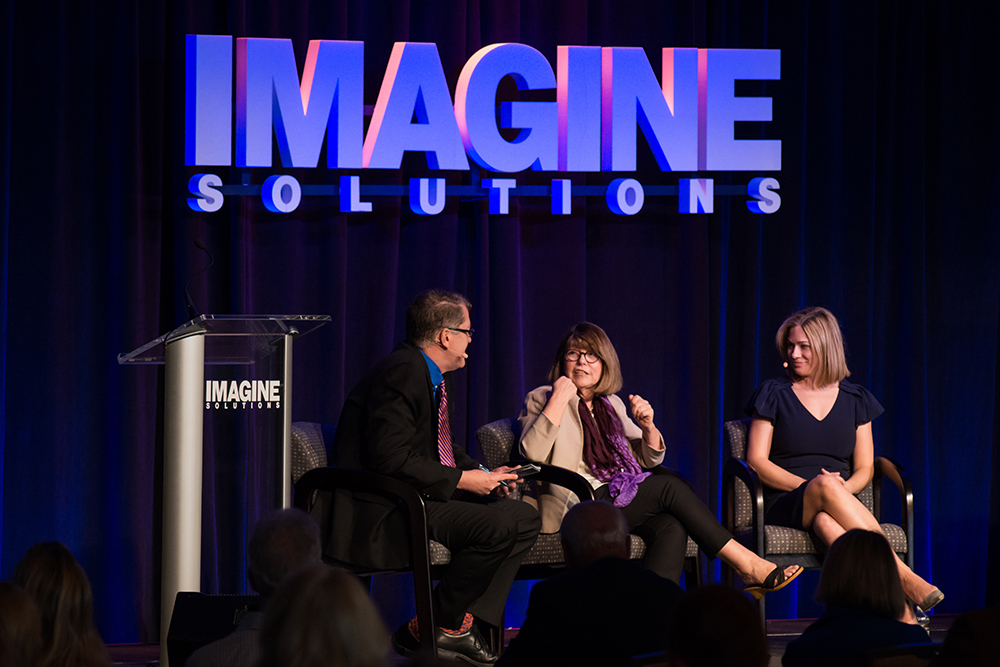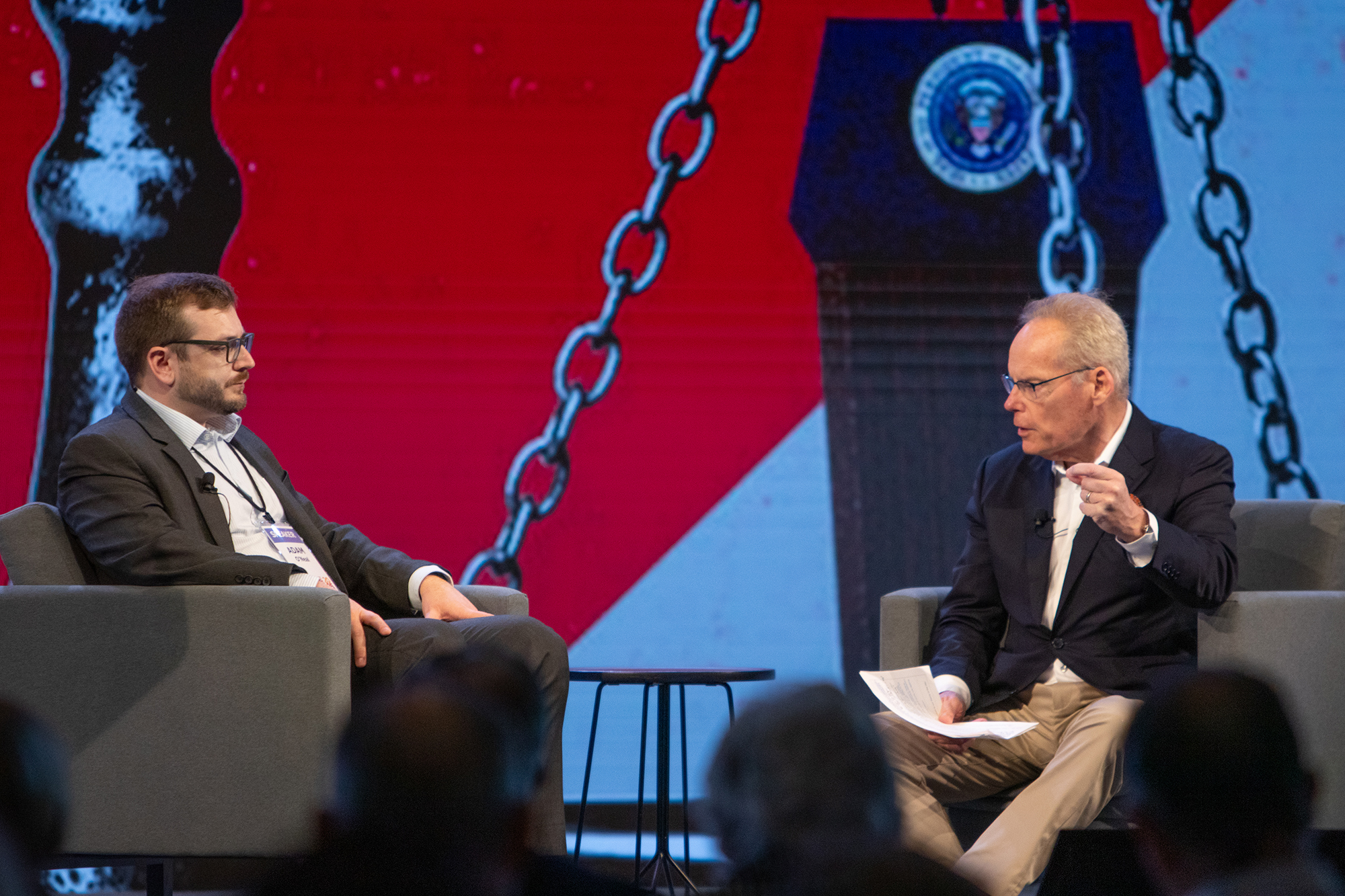Elevating Digital Truth for Societal Wellbeing
Lee Rainie of the Pew Research Center comes on the Imagine Solutions stage to talk about the essential nature of truth and trust. These are core components of a healthy society, the potency of which has been diminished in recent times. Why is truth struggling so significantly? Dark digital corners are having a damaging effect, spreading false information immediately and extensively. We live in a world of total noise, making it hard to sort through information. Creating doubt further creates confusion, which influences our opinions even of each other. Our attention has been monetized. Watch and listen to think about how we begin to counteract these forces, drawing on historical lessons.
00.07
I have a solution to the last question which you just clone Randy antic that would solve all of our problems I'm here to talk about truth and it's having a Brillion everywhere you look the institutions that were designed many decades ago to advance truth faced new struggles in the age of new information in the digital spaces educators scientists journalists civic leaders business leaders and we at the Pew Research Center studies these issues about truth and Trust because they're so central to the health of us a society and we're finding that American culture is very downcast these days just before the 2016 election 81 percent of American adults said the supporters of Donald
01.01
Trump and the supporters of Hillary Clinton could not agree on the basic facts of what's going on in the world just after the election 64% of Americans said that fake news was causing a lot of confusion about what was going on in public life the problem has even reached the personal level 26% of all Americans including almost half of those under age 30 say that false information about them has been posted online and damaged their reputations I want to tell you a story now about why truth struggles to find a foothold in this new environment and I want to stress though that even though I'm talking about a major news event the dynamic I'm describing applies to almost every other domain where people care about truth and are trying to advance the story of truth the story begins last October first when Steven paddock broke through the window
02.02
of his hotel room overlooking the Las Vegas Strip and began firing into the crowd below he ended up killing 58 people and wounding 422 others within minutes of the start of the shooting a discussion broke out on Paul channel of the 4chan online message board now for chann is a very dark corner of the internet and the Paul channel is specifically devoted to politically incorrect conversation the users on that channel immediately began to gameplan how they could make it look like the shooter was a left-winger control the narrative don't let fake news control and narrative was one of the discussion threads they led shortly after the police announced that paddock the shooters ex-wife Mary Lou Dan Lee was a
03.00
person of interest the trolls began to focus on another target in their work and it was Dan Lee's ex-husband a guy named Jerry Dan Lee who had nothing to do with the shooting but he was a really convenient target because his facebook profile showed that he was a supporter of MSNBC's Rachel Maddow and of the left-leaning group moveon.org as the 4chan pal channel built sympathetic websites began to adopt the story that mr. Dan Lee not the real shooter paddock was the shooter and it was potentially tied to his liberal politics this is the story that ran on gateway pundit over on Google which is primed it during the course of major breaking news stories to emphasize brand new information that comes to the story and particularly to elevate a lot of stories that were getting search queries it picked up the conversation about Dan Lee being the
04.00
shooter again he's not the guy patek is the guy but Google elevated that story to a prominent place on its news page on Facebook the news elevating system ended up highlighting a story that was false that came out from the russian-backed new system Sputnik that said that Isis the terror group was trying to claim credit for the shooting and finally on YouTube there were prominent videos that falsely claimed that the people who were being interviewed on TV about the shooting in other words the people who had been shot at were actually so-called crisis actors who had been hired by the government to stage fake news stories that would help liberal causes the unfolding info war over the worst mass shooting in American history showed how a band of extremists
05.00
conspiracy theorists and foreign propagandists could essentially hijack a news story and use the tools of social media to sow a lot of confusion so this story I think illustrates the three big things that make it hard for truth to find its footing these days the first thing is that we live in a world of total noise there's so much more information swirling around now it's just hard to sort through it even for ordinary folks in ordinary times what the new anti truthers exploit now is how confusing it is to get through this system and they're not so much planting information in the hopes that people will believe false facts their real motive is just to sow enough doubt and confusion that the people who care about the facts give up in their search and begin to distrust the institutions that are trying to deliver the truth to them there's a wonderful word for that
06.01
process and it was coined by Stanford history professor Robert Procter the word is AG Natale G and it combines two Greek words AG no not knowing low G the science of not knowing it turns out the new anti truthers are wonderful at the practice of AG Natale G in a world overflowing with information the mere act of creating doubt in people's minds turns out to be a spectacularly successful strategy for disrupt disrupting social cohesion the second reason truth struggles in this the current environment it ties to political polarization and how it affects people's judgments about civic information and even about each other in the past generation America's political parties have ideologically purified themselves generation ago there used to be a decent share of people who were liberal who
07.01
called themselves Republican and there were a decent share of people who were conservative who called themselves Democrats and those are the people who often got together and figured out how to come up with solutions and new programs but nowadays the average Republican is more conservative than 93% of Democrats the average Democrat is more liberal than 94% of Republicans the center is vanishing in addition at the personal level people in both camps now increasingly say that those on the other side are awful human beings who are trying to destroy the country increasingly people in both can't say the other side is full of people who are closed-minded immoral dishonest and unintelligent in it so that means this environment now is full of people who are not necessarily motivated by sharing facts and coming up with solutions or coming up with at least a shared version of experience they're motivated to mount
08.01
arguments that make my team look great and the other team look despicable the third problem that's highlighted by this story is that the new businesses tied to the attention economy the social media platforms incentivize what political cartoonists Tim Crider calls outrage porn the business model of these companies of course is to gather up as much of our attention as possible and then sell it to advertisers and facts and information don't engage people nearly as much as the emotionally incendiary stuff does that's what keeps people coming back for likes and clicks and stuff like that so these systems are arranged to outrage folks and then exploit to non-human actors algorithms and BOTS to sort of guarantee that the stuff that I get in my info stream on a social media platform
09.01
lights up my emotional hot buttons and the stuff you get in your streams lights up yours oftentimes we don't even share the same facts it's a formula for alienation so how do we start making progress against these forces a great place to sort of course is the lessons of history American scholar Elizabeth Eisenstein wrote a magnificent book called a printing press as an agent of change in which she looked at the world after the Year 1450 when the printing press came into being and described all the changes that came when information became much much cheaper to produce and much easier to spread well it turns out that some of the prominent beneficiaries of the printing press were the fake news promoters of the time it was people who believed in alchemy people who practice witchcraft people who subscribed to the occult people who practiced folklore they turns out that those kinds of
10.02
groups got about another hundred and fifty years worth of life because they were so effective at exploiting these new communication mechanisms to spread the word about themselves and find supporters of course a couple of generations after the printing press was invented we did get the Scientific Revolution and some really wonderful ideas about truth and facts one of the breakthroughs from the Scientific Revolution was the idea the truth is best established through a process of induction that is gathering facts and evidence and analyzing them that's a much better way to get to the truth in the process of deduction which is just thinking about stuff really hard a second breakthrough idea was the notion that truth is best extracted from data that are gathered dispassionately not by self-promoting activists but people who are curious and wanted to know answers to big questions and one of the best ways to show dispassion in the gathering
11.01
of evidence is to use numbers and statistics you know they're only a couple of hundred years old as an idea but it's a wonderful way to show that you are using an honest method of gathering in for the third big idea that came out of this Scientific Revolution is the truth is really not conclusively established until the researchers share their data and findings with others so that they can be fact checked and verified by other analysts it turns out that when we talk to thousands of technologists about the future of truth those lessons from history came up pretty prominently in a lot of their answers we recently did a survey of experts both technologists and scholars about the future of truth and about half of the respondents said the things in the coming years are going to get better for truth and about half said that's not the case the people who are most downcast in their ideas tended to
12.02
be technologists who basically said trolls will always find ways to use new tools to torment people they basically said human nature is immutable and manipulable we're all tribal and we can all be victimized by any of these new tools those who gave the more hopeful answers did cite some of those lessons from history and they had a somewhat larger time frame to their answers they basically said the stuff we were talking about can be applied to the current moment in the moment in the future for starters we are in the golden age of data and even more so in the future and the people who practice induction who analyze data and make meaning out of it are going to have a field day for as far into the future as anybody can imagine the second thing they talk about is that there are software tools that are better and better and better at analyzing those data and increasingly are able to minimize human biases in the
13.03
analysis of the data and to marginalize the worst actors in the new information ecosystem the third idea they embraced from the past is more education you might remember that one of the great things that came pretty far after the Scientific Revolution was we finally got universal education the hopeful technologists say that we're gonna move into an era where it'll be essential for all of us to develop new literacies and new learning based around tech savviness information savviness and even algorithm savviness so the world these hopeful people are thinking about it's essentially a cyborg world a world where humans and artificial intelligence machines work together to elevate truth and depress falsity which brings me to a wonderful story about the cyborg the human machine search for truth that's
14.00
told by a great technology pundit named Nicholas Thompson you might remember Watson the artificial intelligence system developed by IBM IBM Watson became famous because it beat the Galactic world champion of Jeopardy Ken Jennings in a televised showdown so Watson beat a human being great day well there were lots of practice runs of Watson before you know he went on camera or whatever it is he she it I I beat Ken Jennings so they went through lots of practice runs and during one of the practice runs the question that was put to Watson was complete this phrase Toto I have a feeling where and Watson immediately came up with the answer we're not in Kansas anymore one of the special features of Watson of course that it spits out lots of other answers and then rank orders them by the
15.01
probability that they're correct so the second answer Watson gauge to the Toto question was the name Steve poor Carol turns out poor Carol was this keyboardist for the pop band toto so linking him and Toto wasn't a ridiculous thing even though it was it was wasn't the right answer but Watson's third answer to the Toto question was ridiculous the kung-fu actor Jackie Chan now nobody could make sense of that and when Nicholas Thompson the pundit wrote up a piece about the the Watson preparations for the showdown he basically used the Jackie Chan answers as an example of showing AI might be great but it's it's got a ways to go still because it still generates ridiculous answers like this so Thompson's writes up this thing in his piece appears in the New York Times on its website and it turns out that a
16.00
commenter on his piece on the website figured out the Toto Jackie Chan connection so here I'm going to show you a scene from the movie rush hour one where at street savvy American detective is working with a detective from Hong Kong played by Jackie Chan the Chan character is in the United States to investigate a kidnapping and in this scene he and the American are discussing how they're going to work together sorry sorry sorry sorry one more back okay yes it is no it ain't this is the United States of James Carter now I'm the president I'm the Emperor I'm the king I'm Michael Jackson you Tito your ass belong to me okay now here's a scene
17.05
from the sequel to that movie rush hour to reach the two detectives are joined and it refers to this scene while they're in a karaoke bar in Hong Kong this place the moves that we gain in China you think this give me I'm from Los Angeles we invented gangs give me that badge no your civilian in Hong Kong and Michael Jackson yuck puto mean Tito Toto is what we ate last night for dinner next minute bitch and that's how todo got into Jackie Chan's life so Jackie Chan wasn't a ridiculous answer to the Jeopardy question maybe that's the cyborg story of how we're gonna get to the truth using humans and machines the artificial intelligence system will be an essential component of it but it will take that commenter on that website that human actor to put the final puzzle piece together and get to the truth thanks very much
18.00
[Applause]

